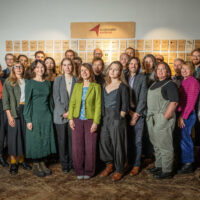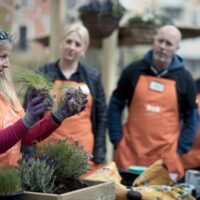One Planet Living®
Imagine a world where everyone, everywhere, lives happy, healthy lives within the limits of the planet, leaving space for nature. We call this One Planet Living, and we believe it’s achievable.
But globally we are living as if we have more than one planet. In fact, ecological footprinting shows that if everyone in the world consumed as much as the average person in western Europe, we’d need three planets to support us.

The origins of One Planet Living®
Using our learning from the BedZED eco-village, Bioregional created the One Planet Living sustainability framework – comprising ten simple principles and detailed goals and guidance – and developed it together with WWF.
Backed by science and many years of hands-on experience, it’s a highly flexible framework that is helping organisations around the world to achieve their vision of a brighter, better future.
How the framework is used today
→ Beyond compliance
One Planet Living® makes it easy for you to identify gaps and opportunities for more inspiring change. It encourages creative responses to local situations that go beyond tick-box compliance.
→ Never cookie-cutter
The ten principles might look like a template, but they’re actually designed to inspire creativity and innovation. Irresistibly simple but wonderfully flexible. A great tool for galvanising teams.
→ Enablers not theorists
With our guidance, or in collaborative workshops with us, the framework becomes a powerful tool for prioritisation and target-setting. Thousands of organisations across the world have used it to create meaningful change.
The ten One Planet Living® principles:

Who can use One Planet Living?
Anyone can use our One Planet Living framework - it's helped a range of sectors achieve their sustainability ambitions. Discover the free resources available for:
- property developers and housebuilders
- businesses
- local authorities
- tourist resorts and destinations
- schools and community groups.
If you are an individual, check out our actions for achieving One Planet Living.
If you are a local authority or community group that wants to use One Planet Living to create a better, more sustainable future for your local area check out how we can help.
How does it work?
The framework is designed to support you in creating a 'One Planet Living action plan' that acts as a route map towards a more sustainable future for your organisation. It comprises:
- ten simple principles that cover all aspects of social, environmental and economic sustainability
- detailed goals and guidance documents – these provide advice and ideas on the goals, actions, targets and indicators you could set for your 'One Planet Living action plan' - this is your plan to achieve One Planet Living.
We can give you support, tools and training to create a One Planet Living action plan, and we will endorse the best plans. Find out how to get started.
One Planet Living is different from other sustainability frameworks because:
- It puts people first – it’s grounded in the reality of how people live their lives rather than box ticking
- It’s holistic – nothing will drop through the gaps with our 10 principles
- It’s about true sustainability – there’s no greenwashing
- It reaches hearts as well as minds - One Planet Living is used to inspire people across the world to get involved in sustainable change.
There are now 1.4 million people around the world living in, working at or visiting organisations and communities with a deep commitment to One Planet Living.

Since the inception of the project, One Planet Living has helped us design and fine-tune a unique concept for a tourism resort based upon sustainability.
Marie Balmain, CSR and Foundation Director at Group Pierre & Vacances Center Parcs

What’s really exciting about One Planet Living is its ability to change hearts as well as minds. It’s a fantastic tool for making sustainability accessible to all.
Kevin Hydes, CEO of Integral Group and former chair of the World Green Building Council



